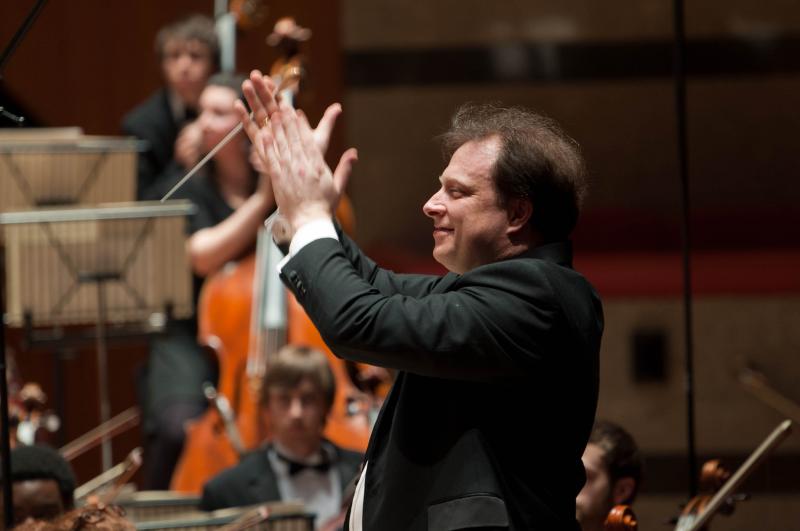Sudbin, CBSO, Seal, Symphony Hall Birmingham | reviews, news & interviews
Sudbin, CBSO, Seal, Symphony Hall Birmingham
Sudbin, CBSO, Seal, Symphony Hall Birmingham
Expansive Beethoven and Scriabin with a classical flavour

You can read a lot into the first two chords of Beethoven’s "Eroica" Symphony. Classical portico or violent detonation? Majestic assertion of E flat major, or the first shocking glimpse of a drama that’s already under way? Michael Seal, conducting the City of Birmingham Symphony Orchestra, accelerated through those first two bars before sweeping into a sleek, swinging first subject. He could afford to let his players sing.
And at critical points of each of the symphony’s four movements, Seal let that violence break through. Gradually, thrillingly, the speed started to push, textures began to shake apart and raw emotion – usually heralded by the black tone of the German rotary trumpets that the CBSO has taken to using in this repertoire – overwhelmed the symphonic argument. Seal’s mastery of orchestral sonority was audible throughout: some of it (the roistering, full-fat CBSO horn sound in the Scherzo's Trio) simply a matter of empowering his players to play, other instances – like the way that as vibrato-less violins quietly ended a phrase in the Funeral March, the cellos and basses growled upwards to continue their line – more subtle and intuitive. Matthew Hardy’s timpani were a powerful agent of misrule.
Throughout, Seal’s reading followed through on the subversive logic of that headlong opening; paragraphs of Bruckner-like spaciousness and grandeur were punctuated, confronted and swung around by those climactic passages of violent release. This wasn’t the roughest "Eroica" you’ll hear - or for that matter the smoothest - but it was intelligent, articulate and on its own terms powerfully convincing.
 Seal had opened the concert with a performance of Rimsky-Korsakov’s Capriccio Espagnol – one of those supposedly hackneyed popular classics that you actually never seem to hear any more. Rimsky said that in the Capriccio orchestral colour is the musical substance, and Seal responded by simply playing the socks off it. Rhythms were crisp, colours iridescent, and amidst a parade of exuberantly characterised solos, Oliver Janes’s clarinet and flautist Marie-Christine Zupancic’s fresh, fluid tone stood out. It was gleefully, unapologetically up-front, and the all-rattling, all-jangling final Alborada brought cheers from the audience. There’s life in this warhorse yet.
Seal had opened the concert with a performance of Rimsky-Korsakov’s Capriccio Espagnol – one of those supposedly hackneyed popular classics that you actually never seem to hear any more. Rimsky said that in the Capriccio orchestral colour is the musical substance, and Seal responded by simply playing the socks off it. Rhythms were crisp, colours iridescent, and amidst a parade of exuberantly characterised solos, Oliver Janes’s clarinet and flautist Marie-Christine Zupancic’s fresh, fluid tone stood out. It was gleefully, unapologetically up-front, and the all-rattling, all-jangling final Alborada brought cheers from the audience. There’s life in this warhorse yet.
Scriabin’s solitary Piano Concerto, meanwhile, continues to hover on the fringes of the repertoire, with most of its (fairly rare) champions treating it either as supercharged Chopin or half-baked Rachmaninov. Not Yevgeny Sudbin (pictured above). Seal went for clarity rather than poetry in the opening bars, and it soon became clear that this was precisely Sudbin’s own approach. Scriabin’s too: what we usually hear as a perfumed dream of a first movement is actually marked Allegro.
There was no wallowing here, and no grandstanding either: Sudbin’s gleaming, transparent chains of notes fell elegantly and expressively into place. Scriabin as classicist? It had a lovely purity, and Seal and Sudbin let the final, glowing F sharp major piano chord fade in the air long after the orchestra had fallen silent. Again, simply doing what Scriabin wrote shouldn’t feel quite so radical; as it was, that fidelity was probably responsible for Sudbin receiving an ovation that was warmly appreciative rather than torrential. Just as he’d allowed the orchestral soloists in the Capriccio to take most of the applause, Seal now left the stage to his soloist: a typically generous gesture from this fine and hugely undervalued conductor.
rating
Explore topics
Share this article
The future of Arts Journalism
You can stop theartsdesk.com closing!
We urgently need financing to survive. Our fundraising drive has thus far raised £49,000 but we need to reach £100,000 or we will be forced to close. Please contribute here: https://gofund.me/c3f6033d
And if you can forward this information to anyone who might assist, we’d be grateful.

Subscribe to theartsdesk.com
Thank you for continuing to read our work on theartsdesk.com. For unlimited access to every article in its entirety, including our archive of more than 15,000 pieces, we're asking for £5 per month or £40 per year. We feel it's a very good deal, and hope you do too.
To take a subscription now simply click here.
And if you're looking for that extra gift for a friend or family member, why not treat them to a theartsdesk.com gift subscription?
more Classical music
 theartsdesk at the New Ross Piano Festival - Finghin Collins’ musical rainbow
From revelatory Bach played with astounding maturity by a 22 year old to four-hand jazz
theartsdesk at the New Ross Piano Festival - Finghin Collins’ musical rainbow
From revelatory Bach played with astounding maturity by a 22 year old to four-hand jazz
 Kanneh-Mason, Britten Sinfonia, Shave, Milton Court - a grin and a big beaming smile
A pair of striking contemporary pieces alongside two old favourites
Kanneh-Mason, Britten Sinfonia, Shave, Milton Court - a grin and a big beaming smile
A pair of striking contemporary pieces alongside two old favourites
 First Person: Manchester Camerata's Head of Artistic Planning Clara Marshall Cawley on questioning the status quo
Five days of free events with all sorts of audiences around Manchester starts tomorrow
First Person: Manchester Camerata's Head of Artistic Planning Clara Marshall Cawley on questioning the status quo
Five days of free events with all sorts of audiences around Manchester starts tomorrow
 Goldscheider, Brother Tree Sound, Kings Place review - music of hope from a young composer
Unusual combination of horn, strings and electronics makes for some intriguing listening
Goldscheider, Brother Tree Sound, Kings Place review - music of hope from a young composer
Unusual combination of horn, strings and electronics makes for some intriguing listening
 theartsdesk Q&A: composer Donghoon Shin on his new concerto for pianist Seong-Jin Cho
Classical music makes its debut at London's K-Music Festival
theartsdesk Q&A: composer Donghoon Shin on his new concerto for pianist Seong-Jin Cho
Classical music makes its debut at London's K-Music Festival
 Helleur-Simcock, Hallé, Wong, Bridgewater Hall, Manchester review - moving lyricism in Elgar’s concerto
Season opener brings lyrical beauty, crisp confidence and a proper Romantic wallow
Helleur-Simcock, Hallé, Wong, Bridgewater Hall, Manchester review - moving lyricism in Elgar’s concerto
Season opener brings lyrical beauty, crisp confidence and a proper Romantic wallow
 Kohout, Spence, Braun, Manchester Camerata, Huth, RNCM, Manchester review - joy, insight, imagination and unanimity
Celebration of the past with stars of the future at the Royal Northern College
Kohout, Spence, Braun, Manchester Camerata, Huth, RNCM, Manchester review - joy, insight, imagination and unanimity
Celebration of the past with stars of the future at the Royal Northern College
 Jansen, LSO, Pappano, Barbican review - profound and bracing emotional workouts
Great soloist, conductor and orchestra take Britten and Shostakovich to the edge
Jansen, LSO, Pappano, Barbican review - profound and bracing emotional workouts
Great soloist, conductor and orchestra take Britten and Shostakovich to the edge
 Jakub Hrůša and Friends in Concert, Royal Opera review - fleshcreep in two uneven halves
Bartók kept short, and a sprawling Dvořák choral ballad done as well as it could be
Jakub Hrůša and Friends in Concert, Royal Opera review - fleshcreep in two uneven halves
Bartók kept short, and a sprawling Dvořák choral ballad done as well as it could be
 Hadelich, BBC Philharmonic, Storgårds, Bridgewater Hall, Manchester review - youth, fate and pain
Prokofiev in the hands of a fine violinist has surely never sounded better
Hadelich, BBC Philharmonic, Storgårds, Bridgewater Hall, Manchester review - youth, fate and pain
Prokofiev in the hands of a fine violinist has surely never sounded better
 Monteverdi Choir, ORR, Heras-Casado, St Martin-in-the-Fields review - flames of joy and sorrow
First-rate soloists, choir and orchestra unite in a blazing Mozart Requiem
Monteverdi Choir, ORR, Heras-Casado, St Martin-in-the-Fields review - flames of joy and sorrow
First-rate soloists, choir and orchestra unite in a blazing Mozart Requiem
 Cho, LSO, Pappano, Barbican review - finely-focused stormy weather
Chameleonic Seong-Jin Cho is a match for the fine-tuning of the LSO’s Chief Conductor
Cho, LSO, Pappano, Barbican review - finely-focused stormy weather
Chameleonic Seong-Jin Cho is a match for the fine-tuning of the LSO’s Chief Conductor

Add comment